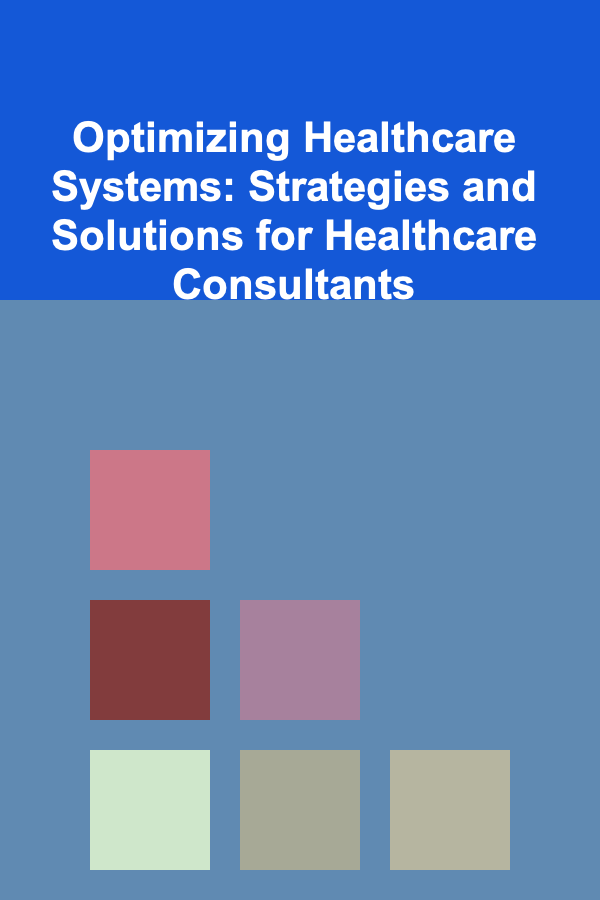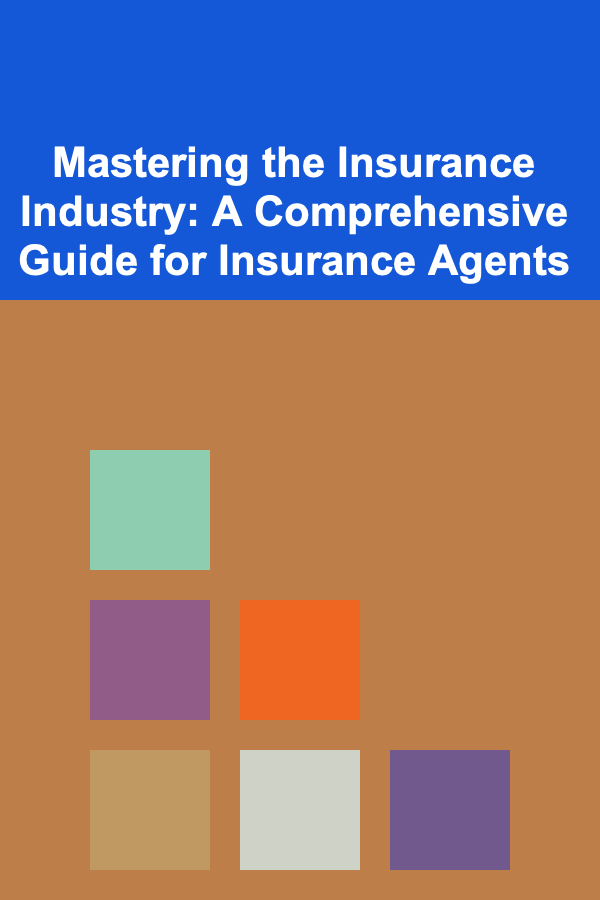
Optimizing Healthcare Systems: Strategies and Solutions for Healthcare Consultants
ebook include PDF & Audio bundle (Micro Guide)
$12.99$10.99
Limited Time Offer! Order within the next:

The healthcare industry is undergoing rapid transformations. From advancements in medical technology to changes in regulatory frameworks, the landscape is shifting, and healthcare organizations need to adapt. For healthcare consultants, the ability to optimize healthcare systems effectively is essential for ensuring that healthcare providers remain efficient, financially sustainable, and focused on delivering high-quality care to patients.
In this actionable guide, we will explore various strategies and solutions that healthcare consultants can use to optimize healthcare systems. These strategies are designed to improve operational efficiency, enhance patient care, reduce costs, and address the challenges that healthcare organizations face in an increasingly complex environment.
Understanding the Healthcare System's Core Challenges
Before diving into strategies, it's important to recognize the key challenges that healthcare systems face. Healthcare consultants need to develop a deep understanding of these issues to recommend effective solutions. Common challenges include:
- Rising Healthcare Costs: Healthcare costs continue to increase due to factors like aging populations, chronic diseases, and technological advancements.
- Regulatory Compliance: Healthcare organizations must comply with an ever-growing number of regulations, ranging from patient privacy laws like HIPAA to complex billing regulations.
- Quality of Care: With the focus on improving patient outcomes, healthcare organizations need to enhance the quality of care while maintaining cost efficiency.
- Technological Integration: The adoption of digital health tools, such as Electronic Health Records (EHRs) and telemedicine, presents both opportunities and challenges for healthcare providers.
- Workforce Management: Healthcare organizations often struggle with workforce shortages, burnout, and maintaining employee satisfaction while managing high patient volumes.
Strategy 1: Streamlining Operational Processes
One of the key roles of healthcare consultants is to identify inefficiencies in healthcare organizations' operations. Streamlining processes can save time, reduce errors, and lower costs. Here are some actionable steps for optimizing operations:
1.1 Process Mapping and Analysis
Healthcare organizations are typically large and complex, with numerous departments and functions that need to work seamlessly. Mapping out the processes of a healthcare system is crucial in identifying inefficiencies and redundancies. Process analysis involves examining the flow of patients, data, and tasks throughout the system.
Actionable Steps:
- Identify Bottlenecks: By mapping out patient flows, administrative tasks, and clinical workflows, consultants can pinpoint bottlenecks or areas of inefficiency.
- Eliminate Redundancies: Many healthcare processes, like data entry and patient referrals, may be duplicated or unnecessarily complex. Simplifying these processes can save time and reduce costs.
- Adopt Lean Methodology: Lean principles, which focus on reducing waste and improving efficiency, can be applied to healthcare settings. Consultants can guide healthcare organizations in adopting these practices.
1.2 Implementing Automation
Automation tools can significantly improve operational efficiency. Healthcare consultants can help organizations implement automated systems for tasks such as scheduling, billing, and patient follow-ups. Automation reduces manual errors, ensures consistency, and frees up staff to focus on more value-added tasks.
Actionable Steps:
- Adopt Robotic Process Automation (RPA): RPA can automate repetitive tasks such as claims processing, insurance verification, and administrative workflows.
- Use AI for Appointment Scheduling: Implementing AI-driven appointment scheduling can reduce patient wait times and improve resource allocation.
- Telemedicine Integration: Integrating telemedicine into routine care pathways can optimize both administrative and clinical operations by reducing patient no-show rates and improving access to care.
Strategy 2: Enhancing Patient-Centered Care
Patient-centered care is critical for improving patient outcomes, satisfaction, and overall healthcare system efficiency. Healthcare consultants should guide organizations in adopting patient-centered approaches that prioritize patient needs, preferences, and values.
2.1 Improving Care Coordination
One of the major barriers to effective patient-centered care is fragmented care. Patients often see multiple providers who do not communicate effectively, which can lead to errors, delays, and poor outcomes.
Actionable Steps:
- Create Care Teams: Establish multidisciplinary care teams consisting of physicians, nurses, social workers, and other relevant professionals to improve communication and care delivery.
- Implement Health Information Exchange (HIE): HIEs allow healthcare providers to share patient data across systems securely, reducing fragmentation and ensuring a more cohesive care experience for patients.
- Leverage EHR Systems: EHR systems are essential for consolidating patient data, streamlining communication between providers, and ensuring continuity of care.
2.2 Personalized Treatment Plans
Personalized care means developing treatment plans based on an individual's specific health needs, preferences, and circumstances. This requires using data to understand patient profiles and tailoring interventions accordingly.
Actionable Steps:
- Utilize Predictive Analytics: Consultants can help organizations implement predictive analytics tools to forecast patient needs and customize care plans based on risk factors, chronic conditions, and past medical history.
- Patient-Reported Outcomes (PROs): Integrating PROs into the care process can help healthcare providers better understand the patient's perspective and make more informed treatment decisions.
Strategy 3: Leveraging Technology for System Optimization
Technological advancements are key to optimizing healthcare systems. By embracing digital tools, healthcare organizations can improve clinical outcomes, enhance operational efficiency, and provide better patient care.
3.1 Integrating Electronic Health Records (EHR) and Health Information Systems
EHR systems are foundational to improving healthcare delivery. EHRs help ensure that patient data is easily accessible, enabling more informed decision-making and better communication among healthcare teams.
Actionable Steps:
- Optimize EHR Usage: Consultants should help healthcare organizations optimize the use of their existing EHR systems by ensuring that they are properly integrated into clinical workflows. This may involve customization to suit the needs of different specialties or departments.
- Ensure Interoperability: EHR systems need to be interoperable with other technologies and systems to facilitate data sharing across different care settings.
- Training and Adoption: Provide staff training to maximize the effectiveness of EHR systems, ensuring that they are used efficiently and securely.
3.2 Telemedicine and Remote Patient Monitoring
Telemedicine and remote patient monitoring (RPM) are increasingly important in optimizing healthcare systems. These technologies offer a way to improve access to care, reduce hospital readmission rates, and lower healthcare costs.
Actionable Steps:
- Expand Telehealth Capabilities: Consultants can guide healthcare organizations in expanding their telehealth services to provide virtual consultations, remote monitoring, and chronic disease management.
- Implement Remote Monitoring Tools: For patients with chronic conditions such as diabetes or heart disease, RPM tools can help providers monitor patients in real time, improving outcomes and reducing hospital visits.
- Ensure Regulatory Compliance: As telemedicine regulations vary by region, healthcare consultants must ensure that organizations comply with local laws regarding licensure, reimbursement, and privacy protections.
3.3 Data Analytics for Informed Decision-Making
Data analytics can drive significant improvements in healthcare system optimization. By analyzing large datasets, healthcare organizations can identify trends, predict patient outcomes, and make evidence-based decisions.
Actionable Steps:
- Develop Predictive Models: Consultants should help organizations develop predictive models to identify at-risk patients, forecast demand for healthcare services, and optimize staffing levels.
- Benchmark Performance: Use data analytics to benchmark performance metrics across various aspects of the healthcare system, such as patient satisfaction, clinical outcomes, and operational efficiency.
Strategy 4: Strengthening Financial and Resource Management
Financial sustainability is a critical aspect of optimizing healthcare systems. Healthcare consultants can assist organizations in improving financial management, reducing waste, and ensuring optimal resource allocation.
4.1 Cost Reduction and Resource Optimization
Reducing operational costs without compromising patient care is a key goal for any healthcare organization. Consultants can identify areas where resources are being underutilized or misallocated, helping organizations make smarter decisions.
Actionable Steps:
- Improve Supply Chain Management: Consultants can optimize supply chain processes by helping healthcare organizations negotiate better contracts with suppliers, reduce waste, and improve inventory management.
- Analyze Financial Performance: By using financial data, healthcare consultants can analyze the cost-effectiveness of different departments or services and recommend adjustments to improve profitability.
- Outsource Non-Core Activities: Consultants should assess opportunities for outsourcing non-core functions such as medical billing, payroll, and administrative services to reduce costs and improve focus on patient care.
4.2 Value-Based Care Models
A shift from fee-for-service models to value-based care can incentivize healthcare providers to improve patient outcomes while controlling costs. Healthcare consultants can guide organizations in adopting these models, which emphasize prevention, coordinated care, and patient satisfaction.
Actionable Steps:
- Implement Bundled Payments: Consultants can help organizations implement bundled payment models, where providers receive a single payment for all services related to a specific treatment or condition.
- Promote Preventive Care: By focusing on preventive measures, healthcare organizations can reduce long-term costs associated with chronic diseases and hospitalizations.
Strategy 5: Fostering a Culture of Continuous Improvement
An essential aspect of healthcare optimization is fostering a culture of continuous improvement. Healthcare consultants play a pivotal role in guiding organizations through this process by encouraging innovation, learning, and accountability.
5.1 Employee Training and Development
Healthcare workers are the backbone of any healthcare system. Continuous education and training are essential to keep staff members up-to-date with the latest practices and technologies.
Actionable Steps:
- Offer Ongoing Training: Consultants can recommend ongoing training programs to improve clinical skills, administrative processes, and patient communication.
- Promote Employee Engagement: Consultants can advise healthcare organizations on strategies to reduce burnout, improve morale, and enhance job satisfaction, all of which contribute to improved patient care.
5.2 Performance Monitoring and Feedback
Creating a robust performance monitoring system is essential for measuring progress and identifying areas for improvement.
Actionable Steps:
- Implement Quality Assurance Programs: Consultants can help healthcare organizations implement quality assurance programs that focus on regularly evaluating performance across different departments.
- Foster Transparency and Accountability: Encourage open feedback channels where employees can report issues and suggest improvements, thus creating a culture of accountability and collaboration.
Conclusion
Optimizing healthcare systems is a multifaceted challenge that requires healthcare consultants to address operational inefficiencies, enhance patient care, leverage technology, and ensure financial sustainability. By implementing strategies such as streamlining processes, embracing technology, improving patient-centered care, and promoting continuous improvement, healthcare consultants can help organizations navigate the complexities of modern healthcare delivery and provide better outcomes for patients.

Creative and Cost-Effective DIY Home Improvement Projects for Beginners
Read More
How to Design a Space-Saving Bedroom for Better Sleep
Read More
How to Explore Nature with Family Hiking Adventures
Read More
How to Manage Multiple Rental Properties Without Overwhelm
Read More
How to Sell Photography Prints on a Personal Website: An Actionable Guide
Read More
Mastering the Insurance Industry: A Comprehensive Guide for Insurance Agents
Read MoreOther Products

Creative and Cost-Effective DIY Home Improvement Projects for Beginners
Read More
How to Design a Space-Saving Bedroom for Better Sleep
Read More
How to Explore Nature with Family Hiking Adventures
Read More
How to Manage Multiple Rental Properties Without Overwhelm
Read More
How to Sell Photography Prints on a Personal Website: An Actionable Guide
Read More